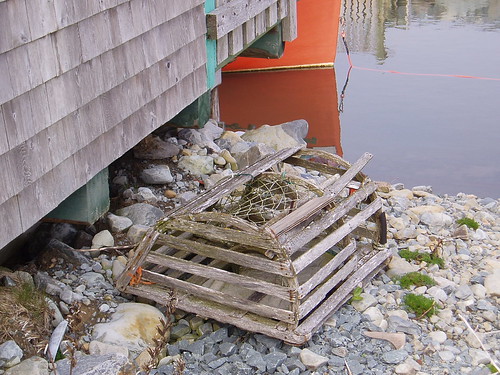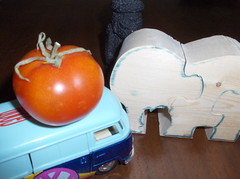I had a really great time last week at the NYSAIS conference in New York… People were great and the human contact and feedback on some ideas was really useful for me. Gave me a little focus you might say. I’ve got two or three posts that are clogging up valuable brain space. I think this is the easiest one to get out, as I repeated it in about three different conversations over the course of the conference.
As people work through the possibilities of creating read/write space and getting participation from their users/members the conversation inevitably turns to wikis. Those lovable scamps that allow people to collaboratively write documents, add content in an inevitably democratic way and really decentralize the position of power normally reserved for submarine captains and webmasters.
The question I was asked (and overheard and couldn’t keep my nose out of) was should I use a wiki as a content management system. I want to start an alumni site at my school, or I want to get teachers to come together and collaboratively write curriculum/lesson plans/learning objects or I want to give people an opportunity to come together and post what’s going on in a way that will allow the content to keep up with the times. You know… I want wikipedia. Except I want it for us.
***************** tangential wikipedia interlude ********************
Wikipedia is a false model. It should not have happened (Indeed, according to various things said by Larry Sanger over the years, it was never meant to happen, Nupedia was meant to be the ‘wiki that lived’. Indeed, he’s trying to build it again now.) There are a couple of things that need to be considered when looking to wikipedia. One, there are many things, people driven or automated, that ensure that the formatting is kept consistent. There are people who check wikipedia pages like other people (used to) smoke. Its a passion, something they live and breathe for. There is also a crucial scaling issue with wikipedia. Its membership group is impossibly large. And the ratio of people editing per pages you might access (as if that was a piece of data i had real research for) is probably never going to be reflected in a personal wiki.
Wikipedia is also, in a sense, the second time this has happened. A quick perusal of the Professor and the Madman will show you that the advent of the Oxford English Dictionary went along the same path… if with more stamps. It is the exception that proves the rule and not something that we should look to for guidance. They also have something like 200 servers. Which i think of as obscene. 🙂
****************** end tagential and minimally researched/relevant interlude*******
There are a couple of situations in which a wiki works extraordinarily well. If you and 5 friends (example overheard and stolen from Nancy White) are working on something that you are all very interested in (and can share) than a wiki might be good for you.
If, for limited period of time, you have a collaborative document that many people need to work on, a wiki might be good for you.
If, like the spectroscopy folks, you are a member of a very passionate society that is changing rapidly and has a central core around which you can float, and you need a way to keep documents very, very current for research purposes, a wiki might be right for you.
If you have someone hired to edit and monitor a wiki, you might make it through.
If you are absolutely committed to spending all of your time on one wiki… that could work.
If you are in a multi-member, multi-investment group… or worse, are trying to start a group to get other people involved, expect a few more difficulties. Wiki editing and particularly formatting can be a real impediment. Many teachers have looked back at their school wikis and found difficulties. (Vicky Davis notwithstanding (she is cool, and does cool stuff with kids and wikis)) More importantly as repositories for work done by many people, the work usually falls to the people who were doing it before. Or, worse, a bunch of stuff gets thrown up on a public site and then that person (mentioned here earlier as the one doing the work) has to go back and do twice as much work editing and formatting the stuff they could have done twice as quickly by sending emails for info and posting it themselves.
Does this mean wikis can’t work. No. Of course not. It just means that the commitment to training and monitoring and mentoring and formatting really has to be there. We’ve found, for instance, that a Drupal, with books enabled, allows for alot of freedom but also keeps alot more formatting.
Do use wikis… just tread lightly, I don’t really see them as a gateway drug. It might be easier to get your community started somewhere else.
Wikis are alot of work. And it seems to be difficult to keep people interested in them for the long haul (at least for me). cheers all.
 1. I was brought up as a lobster fisherman (among other things). Through the different lives I’ve had the pleasure of living there’s been this thread, both the real and the imagined, of the crack of an outboard motor at 5 o’clock in the morning, the feeling of a crab trying to clamp down on my wet, plastic gloved fingers and the fingernail sunrise. I miss the life I’ll never have on the water… probably far more than I would have enjoyed the real life that could have been.
1. I was brought up as a lobster fisherman (among other things). Through the different lives I’ve had the pleasure of living there’s been this thread, both the real and the imagined, of the crack of an outboard motor at 5 o’clock in the morning, the feeling of a crab trying to clamp down on my wet, plastic gloved fingers and the fingernail sunrise. I miss the life I’ll never have on the water… probably far more than I would have enjoyed the real life that could have been.